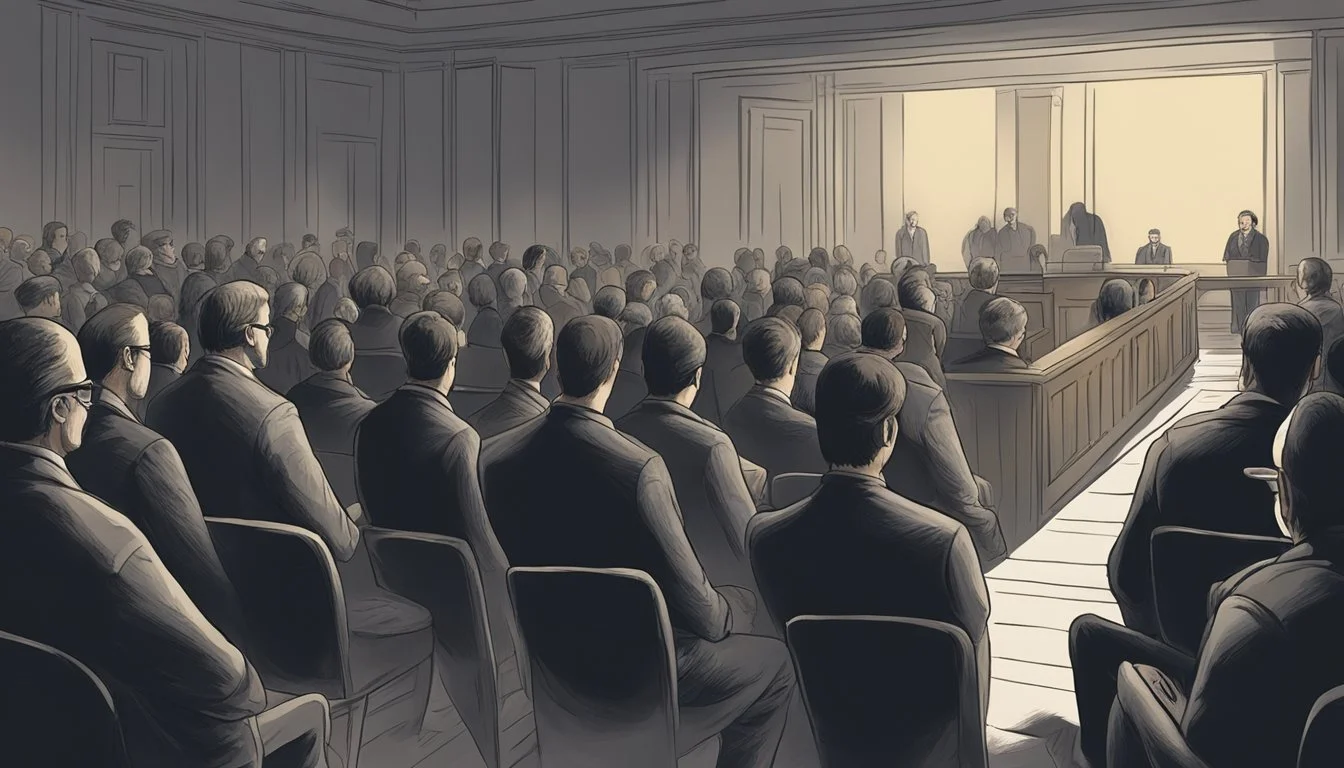6 Controversial Documentaries on the Phantom Social Workers Case
Unraveling the 1990s UK Mystery
The phantom social worker phenomenon captivated public attention in the United Kingdom during the late 1980s and early 1990s. Reports of individuals posing as social workers to gain access to homes with children sparked widespread concern and media coverage. These incidents led to extensive police investigations and left many families feeling unsettled.
Several documentaries have explored the complex and controversial nature of the phantom social worker cases, shedding light on the investigations, societal reactions, and potential explanations. These films examine the blurred lines between urban legend and real incidents, analyzing the social and psychological factors that may have contributed to the phenomenon. By presenting different perspectives and uncovering new information, these documentaries aim to provide a deeper understanding of this unsettling chapter in British social history.
1) The Cook Report: The Satanic Panic
"The Devil's Work" episode of The Cook Report aired in 1989, focusing on alleged satanic ritual abuse in the UK and US. The investigative program, hosted by Roger Cook, examined reported incidents of child and adult abuse linked to satanic practices.
The episode featured interviews with claimed victims and experts, exploring the controversial topic that had gripped public attention. It aired during the height of the Satanic Panic, a period of widespread fear and accusations of satanic ritual abuse.
The Cook Report's coverage contributed to the ongoing debate about the reality of these claims. While some viewed it as exposing a hidden threat, critics argued it perpetuated unfounded fears and moral panic.
The episode remains a notable example of media coverage during the Satanic Panic era. It reflects the heightened concerns and sensationalism surrounding alleged occult activities in the late 1980s and early 1990s.
https://www.imdb.com/title/tt0538322/
2) The Devil's Work: Exposing the Myth of Satanic Ritual Abuse
"The Devil's Work" is a 1989 episode of the investigative series "The Cook Report" that examined alleged incidents of satanic ritual abuse in the UK and US. The documentary, directed by Clive Entwistle, featured interviews with individuals claiming to be victims of such abuse.
The episode aired during the height of the Satanic panic, a period of widespread moral hysteria that began in the 1980s. This panic led to thousands of unsubstantiated cases of alleged Satanic ritual abuse across multiple countries.
"The Devil's Work" presented testimonies from people like Cynthia Angell and Lillith Aquino, who shared their supposed experiences with satanic cults. The documentary also explored the controversial theories surrounding organized abuse by alleged satanic groups.
While the episode aimed to shed light on these claims, it inadvertently contributed to the growing fear and misinformation surrounding Satanic ritual abuse. Subsequent investigations have largely debunked these allegations, revealing them to be products of false memories and moral panic.
The documentary serves as a historical artifact, illustrating the power of mass hysteria and the dangers of uncritical acceptance of extraordinary claims without sufficient evidence.
https://www.imdb.com/title/tt0550154/
3) Wrongly Accused: The Moral Panic of the 80s
The 1980s witnessed a widespread moral panic surrounding alleged child abuse in daycare centers. This phenomenon resulted in numerous false accusations and wrongful convictions.
One documentary explores the McMartin Preschool trial, which became the longest and most expensive criminal case in U.S. history. The film examines how unfounded allegations led to a seven-year legal ordeal that ended with no convictions.
Another film focuses on the Kern County cases in California, where dozens of people were accused of child abuse based on questionable evidence and coerced testimonies. The documentary reveals how overzealous prosecutors and flawed interview techniques contributed to the hysteria.
A third documentary investigates the role of social workers and psychologists in perpetuating the panic. It highlights how certain theories, such as those proposed by Roland Summit, were used to justify aggressive questioning of children.
These films shed light on the factors that fueled the daycare abuse hysteria, including media sensationalism, questionable investigative methods, and societal fears. They serve as cautionary tales about the dangers of unchecked accusations and the importance of due process.
McMartin preschool trial - Wikipedia
4) Dispatches: Britain's Child Snatchers
Dispatches: Britain's Child Snatchers is a documentary that explores the sensitive topic of child protection in the UK. The film investigates cases where children have been removed from their families by social services.
The documentary examines the decision-making processes of social workers and the impact on families. It features interviews with parents who claim their children were unjustly taken into care.
Critics of the system argue that social workers sometimes act too hastily in removing children. The film presents cases where families feel they were unfairly targeted or misunderstood by authorities.
Supporters of child protection policies contend that intervention is necessary to safeguard vulnerable children. The documentary aims to provide a balanced view of this complex issue.
By shedding light on this controversial topic, the film sparked public debate about the child protection system in Britain. It raised questions about the appropriate balance between family rights and child welfare.
https://www.channel4.com/programmes/dispatches/on-demand/71419-001
5) Innocence Lost: The 90s Clerical Child Abuse Scandal
"Innocence Lost" is a series of documentaries produced by Ofra Bikel for PBS FRONTLINE in the 1990s. The films explored allegations of widespread child sexual abuse at the Little Rascals Day Care Center in Edenton, North Carolina.
The series began with "Innocence Lost" in 1991, followed by "Innocence Lost: The Verdict" in 1993. These films documented the accusations, investigations, and trials that rocked the small town.
Bikel's work raised important questions about the fairness of the trials and the reliability of the evidence presented. The documentaries highlighted concerns about interview techniques used with young children and the lack of physical evidence.
In 1997, Bikel released "Innocence Lost: The Plea," which revisited the case and examined how the defendants fared after their convictions. This installment won several awards, including a DuPont Columbia Silver Baton.
The "Innocence Lost" series played a significant role in bringing attention to issues surrounding child abuse allegations and the criminal justice system's handling of such cases.
https://www.pbs.org/wgbh/pages/frontline/shows/innocence/
6) A Dark Tale: Unveiling Social Worker Myths
"Phantom Social Workers" explores the urban legend that gripped the UK in the 1990s. The documentary examines reports of individuals posing as social workers to gain access to homes with children.
It delves into Operation Childcare, a major police investigation involving 23 separate forces. The film analyzes 250 reported cases, revealing that only two were considered genuine by authorities.
The documentary interviews victims like Anne Wylie, who experienced a suspicious visit in Hamilton, Scotland. It examines the psychological impact of these incidents on families and communities.
Experts discuss the societal factors that may have contributed to the spread of this urban legend. The film also explores media coverage and its role in amplifying public fears.
"Phantom Social Workers" offers a balanced look at a complex phenomenon, shedding light on the intersection of social anxieties and child protection concerns.
[https://en.wikipedia.org/wiki/Phantom_social_workers]
Background of the Phantom Social Workers Case
The Phantom Social Workers case emerged in the UK during the 1990s, sparking widespread concern and police investigations. Reports of individuals posing as social workers to gain access to homes with children led to public fear and media attention.
Origins and Development
The phenomenon began in the late 1980s and gained momentum in the early 1990s. Initial reports surfaced in various parts of the UK, with families claiming visits from suspicious individuals claiming to be social workers. These incidents typically involved unexpected home visits where the supposed social workers requested to see or examine children.
As stories spread, public anxiety grew. Media coverage amplified concerns, leading to increased vigilance among parents and communities. The term "Phantom Social Workers" was coined to describe these mysterious figures.
Key Incidents
Several notable incidents fueled the Phantom Social Workers narrative. In Hamilton, Scotland, Anne Wylie reported an unsettling encounter with a woman claiming to be a social worker who tried to gain access to her 20-month-old son. This case received significant media attention.
In 1990, South Yorkshire Police launched "Operation Childcare" in response to mounting reports. This investigation became one of the largest in UK history, involving 23 separate police forces. Over the course of a year, authorities gathered 250 reports.
Of these cases, police ultimately determined only two were genuine incidents of concern, with 18 others warranting further investigation. The vast majority of reports were found to be unsubstantiated or misunderstandings.
Impact on Communities and Families
The phantom social worker case sparked widespread fear and distrust in communities across the UK. Families felt vulnerable and anxious about potential threats to their children's safety.
Psychological Effects
Reports of phantom social workers led to heightened anxiety among parents. Many became hypervigilant about their children's whereabouts and interactions with strangers. Some families experienced sleepless nights and constant worry about potential intruders.
The fear of child abduction caused significant stress for both adults and children. Kids faced restrictions on outdoor play and independent activities. This impacted their social development and sense of freedom.
Mental health issues like paranoia and post-traumatic stress disorder increased in affected areas. Support groups formed to help families cope with the psychological toll of living under perceived threat.
Trust in Social Services
The phantom social worker case severely damaged public trust in legitimate social services. Many families became suspicious of all social workers, even those with proper credentials. This made it difficult for real social workers to carry out their duties effectively.
Some parents refused home visits or evaluations out of fear. This hindered child protection efforts and put vulnerable children at greater risk. Social services departments had to implement new identification protocols to reassure families.
The crisis led to increased scrutiny of social work practices and policies. Background checks and verification procedures were enhanced. Public education campaigns aimed to rebuild trust and teach families how to identify legitimate social workers.
Critical Examination of Media Representation
Media coverage played a significant role in shaping public perception of the Phantom Social Workers case. News outlets and documentaries approached the story from various angles, influencing how the events were understood and interpreted by the general public.
Analyzing Media Narratives
Initial media reports focused on sensationalized aspects of the case, often emphasizing the mysterious nature of the alleged social worker visits. Many news outlets framed the story as a potential conspiracy or organized crime operation. This approach led to increased public anxiety and speculation.
Some documentaries took a more balanced approach, interviewing multiple stakeholders including law enforcement, genuine social workers, and affected families. These films explored the complexities of the case, highlighting the challenges in distinguishing between fact and rumor.
Certain media outlets faced criticism for potentially fueling mass hysteria. Their coverage sometimes prioritized dramatic storytelling over factual accuracy, inadvertently contributing to the spread of misinformation.
Public Perception and Influence
The media's portrayal of the Phantom Social Workers case significantly impacted public opinion. Many viewers formed strong beliefs based on the information presented in news reports and documentaries.
Some documentaries effectively raised awareness about child protection issues and the importance of verifying the credentials of individuals claiming to be social workers. This led to increased vigilance among parents and communities.
Media coverage also influenced how authorities handled the investigation. Public pressure, amplified by intense media scrutiny, pushed law enforcement to dedicate substantial resources to the case.
The varying narratives presented across different media outlets created a fragmented public understanding of the events. This diversity of perspectives highlighted the complex relationship between media representation and public perception in high-profile cases.








